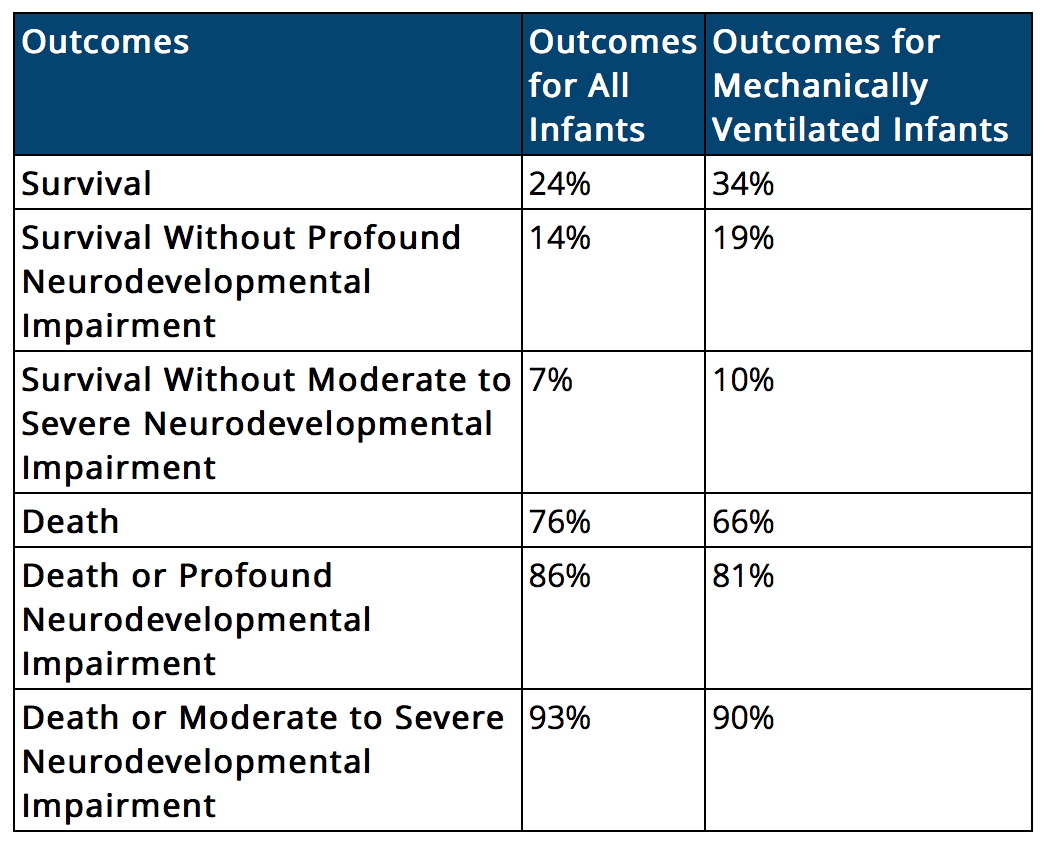
I’ve been wanting to write out Afton’s birth story ever since we got home from the hospital, but on more than on occasion as I sat down to write, I couldn’t get any farther than putting a title on a blank document.
It was too hard to go back.
It’s not that going back there now, three, almost four months later, isn’t hard. It still takes a mustering of emotional energy to think back to those days that transitioned us into this new life. But with a few months having gone by, and with Afton’s due date being today, I think it’d be a good time to stay here long enough to get some of it on paper. Er, whatever. Screens.
One of the things I’ve heard most often from people is this: you’re so brave to share your story.
I mean, now when I scroll back through those first few posts I did on the blog and Facebook and Instagram, I guess it makes sense. If I look at it from the perspective of a normal person, those status updates right after his birth were raw. Intense. Unpolished. Maybe that seems brave.
But here’s a little secret: I am, in fact, not exceptionally brave.
I think I might just seem brave because from the moment Afton was born, I desperately wanted people to love him. That’s all. I continue to share his story not out of bravery, but out of desperation for my son to be known and loved. It’s what any mom wants for her baby. It does not feel brave to share our messy, painful story of life and loss – it just feels like a different type of mothering. It’s a way to keep his life going, to keep him here with me, and maybe with other people, too. Please don’t forget about him, my heart says. Maybe it’s part noble and part selfish, and part not-sure-what-else-to-do, but it sure doesn’t feel brave. This was not an opt-in bravery situation.
Afton’s birth story is a long and unexpectedly beautiful one, and I’m honored that you’re here to share it with us.
Before you read Afton’s birth story, I want you to pause for a minute and try to understand how great a gift you have given me just by knowing him and loving him. The words on my screen are lost in a watery blur as I sit with my gratitude on this. You are loving – present tense – our baby with us, and that is the single most significant gift you could ever give us.
Here it is. A story of first love.
WEDNESDAY, DECEMBER 28

TRIGGER WARNING: THIS birth story CONTAINS REFERENCES TO PREMATURity AND INFANT LOSS.
Throughout my entire pregnancy with Afton, I had one primary health goal: stay calm.
I am a very anxious person, and even when I do not have an extra human living inside my body, I get a little weird about health stuff. By “get a little weird,” I mean that I see a counselor and she helps me get right (s/o to Amanda). Knowing that I was prone to anxiety, I had established calm as a goal from the beginning. I read books like The Headspace Guide to a Mindful Pregnancy and The Secrets of the Baby Whisperer and The Womanly Art of Breastfeeding (<– real). This is a natural process, I said again and again. It will be okay. Stay calm, you are strong, trust your body.
For the last two days, I had noticed a few physical changes that were new. No bleeding or anything major red-flag and scary, but in honor of my goal to not freak out about everything, I had waited two days and now I wanted to make sure things were okay. I called the clinic and the scheduler put me down for sometime on Friday. I almost hung up the phone, but I interrupted her at the last minute, asking if there was any way I could get in earlier. Friday was a busy day for me, and besides, I’d just prefer to get in earlier and put my mind at ease. She told me there wasn’t anything available in the clinic, but that I could just swing into Urgent Care to get checked out if I wanted to get in sooner.
Perfect, I thought. I’ll just knock this appointment real quick. Then I won’t have to worry anymore.
I told Bjork where I was going and that I’d be back in an hour. It was 4pm and friends were coming over at 6pm.
It is the mark of tragedy – that there is absolutely no way to know what’s coming. That it finds you right in the most normal times, that it does not yield to your dinner plans or the fact that you won’t get to pack a bag and say goodbye. That you will leave the house with a spring in your step, not knowing that the next time you walk through that door it will be January 2017, and you’ll be carrying a hospital memory box instead of a baby. It is tragedy, and it is cruel.
I texted Bjork from the waiting room, suddenly feeling a little nervous sitting amongst all the people with face masks and hacking coughs. It plays out like a movie.
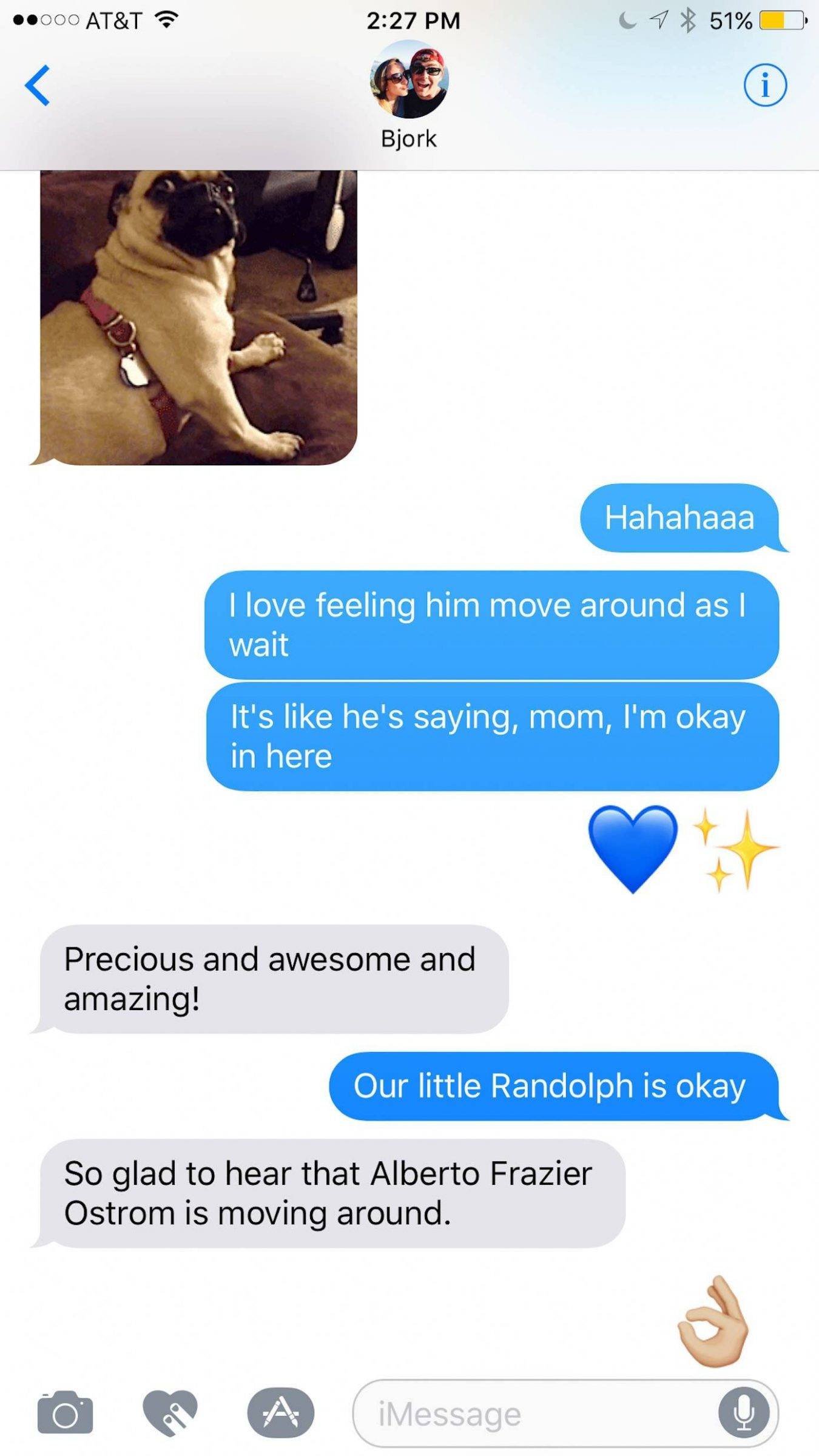
As our lives were about to fall apart, Afton was wiggling around, telling me he was okay with little pop-pop-pop kicks, and we were loving him back by way of baby-naming jokes.
The first thing I heard the urgent care doctor say was a whole lot of nothing. Silence. The second thing I heard was, “Who came with you to this appointment?”
My stomach dropped. I knew this line. This was not a good line. This was the line that was the start to every worst-case-scenario baby story that I had ever heard. My heart was in my throat as I admitted to her that I was the dummy who had come alone. After all the times that Bjork had come with us, this is the one where I had insisted that I could go by myself. Of course. It was exactly like the stories.
The doctor went on, explaining something about membranes and rupture, but it blew past me in a rush of words. All I understood was that something wasn’t right. She wanted us to go get checked out by an OB doctor at the nearest hospital, which was also the hospital we had chosen to deliver at in downtown St. Paul. As I walked out of the office, she confirmed that I was calling someone to come pick me up. “Yes,” I said. “My husband is coming.”
“Okay, good. I don’t think you’ll need the ambulance then,” she responded.
I froze. Ambulance? I thought. What in the actual heck.
Bjork picked me up and we drove to the hospital, just like we had practiced for our tour. We were nervous, but I felt confident, in the deepest part of myself, that things would be okay. I had no reason to believe otherwise – I was feeling great. I texted my parents and a few friends (specifically the friends who were already on their way to my house for dinner) and told them not to worry. I told them we’d probably be going home soon. It was probably a false alarm.
We eventually made our way into the triage room, and I think the doctor who examined me at the hospital could hardly even believe her own words as she told us that I was four centimeters dilated. And my water was about to break. Our baby was coming too soon. I was beyond confused. Hadn’t I just gone in for something else? Hadn’t this just been a routine check? Wouldn’t I KNOW if I was four centimeters dilated and my water was about to break?
They laid me flat immediately, and the doctor took my hand as she started talking about what was next. The possibilities.
“Lindsay, if you deliver tonight…”
TONIGHT? Crash. The gravity of our situation hit me all at once. I understood that the next time I walked out those doors, there would be no baby in my belly, and there might not be one in my arms, either. That this was not the dry run we had joked about on the drive to the hospital – this was the real thing, but worse.
They wheeled me into a hospital room and adjusted my bed to a Trendelenburg position, which, if you’ve experienced, you know feels like some kind of old-school medical torture because it requires your head to be lower than your feet. With a catheter in (wheee!), I was not able to get out of bed, sit up, or even lift my head to eat or drink as they pumped me with drugs that made me feel something between having a ton of bricks in my head and standing on the surface of the sun. They told me I might not move out of this position for weeks. So, yes, it was awesome.
Not really. It was like the twilight zone, because there I laid, a shadow of my happy, strong, healthy, previously calm self – a good mom who had done everything right – and somehow, at 23 weeks, I was in a hospital room, connected to IVs and wires and monitors, hoping and praying for my baby’s life. I had not been in a car accident. I wasn’t drinking. I had never done drugs and I had only eaten one bite of soft cheese (baked, guys, BAKED) at Christmas. I had always heated up my deli meat and I was working really hard to stay relaxed. I was not bleeding and I was not in pain. And yet here I was, in an emergency situation that was practically discovered by accident. It was – and still is – strangely insulting to find that even when you are youngish, healthy, and follow all the rules, you can still land in the category of high-risk pregnancy. Tragedy does not discriminate.
The night went on – 9pm, 10pm, 11pm – and sometime closing in on midnight, the neonatal doctor came in. My parents sat next to the bed, and Bjork was sitting just next to me, and the three of them were working hard to take in all the information from the doctor as he ran through a speech about what life is like for babies who are born at 23 weeks from his perch on a stool at the end of my bed. But I was not even trying. I was watching everything in the room happen around me – floating, emotionally gone, as words like “blindness” and “feeding tube” and “deaf” and “cerebral palsy” and “brain bleed” melted together and dissolved into a dull drone of syllables, hitting my ears but not being absorbed. Statistics. Survival rates. Consequences of extreme prematurity. I literally could not.
Doesn’t he know that three hours ago, I was planning dinner for my friends? Doesn’t he know that I’m healthy, and our baby is healthy, and that we’re going to be okay? “Do you have any questions?” the doctor asked softly. “No,” I said. “No questions.” Please leave the room now, I wanted to say.
We were walking the tightrope of life.
22 weeks, and there would have been nothing doctors could have done.
24 weeks, and there would have been a good chance.
But 23 weeks? It is grey. It is ethics. It has been called one of the most agonizing decisions in medicine. It presents you with statistics like <30% survival and >90% disability. It is burning hell on earth for a brand new parent. We were right smack dab on the mark: 23 weeks and 0 days, which is both as close and as far as you could possibly be. At 23 weeks, doctors don’t assume. They ask you immediately upon arrival to the hospital: should we do everything possible to resuscitate your baby?
I don’t know if words could ever really capture the extent of the pain of this decision.
I am including this in Afton’s birth story because it’s a big part of the truth: that our hearts broke one million times over long before we lost our sweet boy. Choosing to do everything we could to save Afton’s life was a decision, yes. But it was also its own kind of death.
THURSDAY, December 29 & FRIDAY, DECEMBER 30
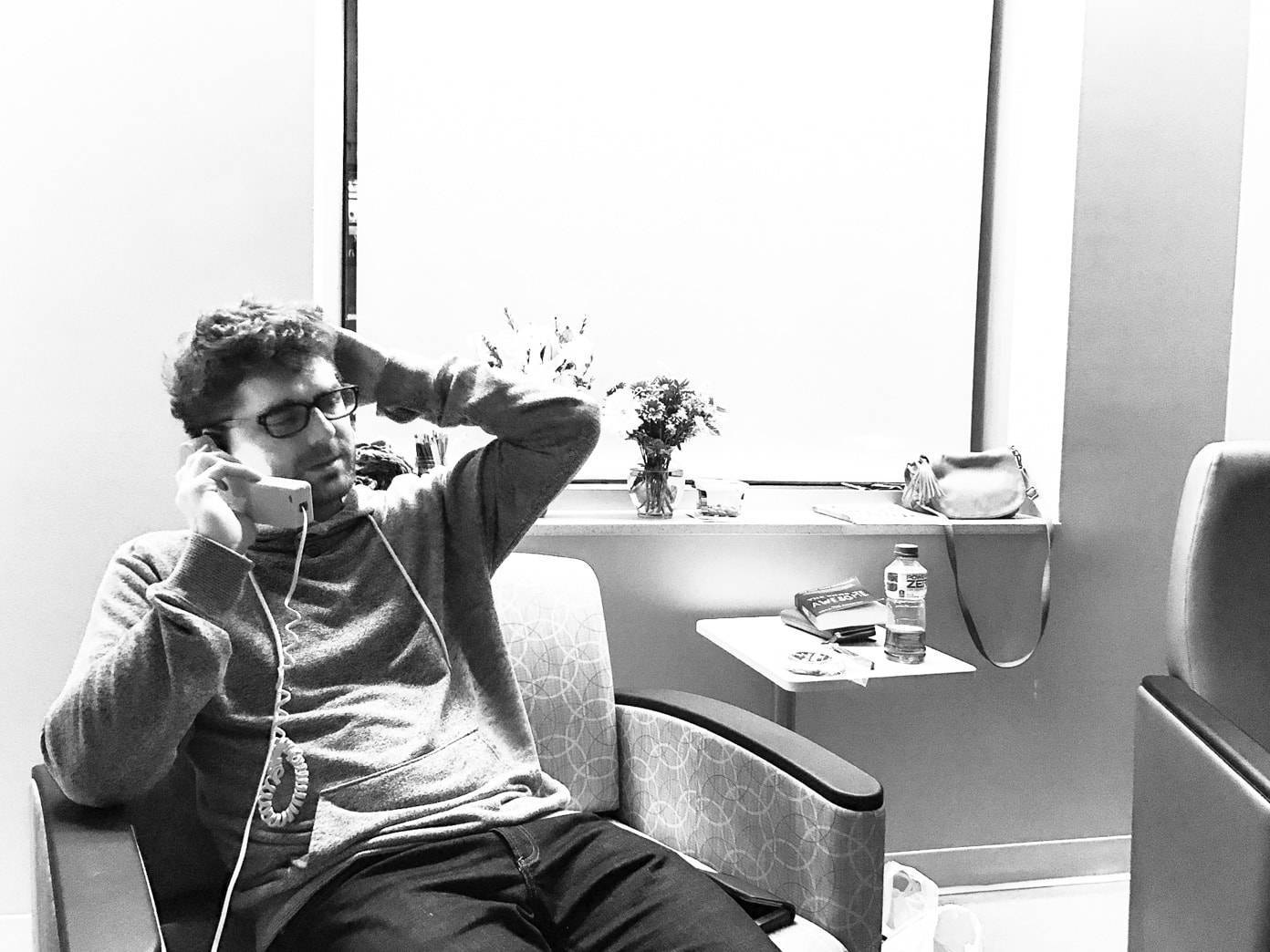
Afton’s best chance at life was to stay inside as long as possible, so we set out on that mission.
The first three days in the hospital looked like encouraging ultrasounds, bedrest, lots of visitors, tons of encouraging emails and comments, very little sleep, a disgusting amount of Magnesium Sulfate, and two massive butt-bruising steroid injections for Afton’s lung development.
Our doctors puzzled over our situation – was it preterm labor? cervical insufficiency? but they didn’t seem as hung up on the mysterious why of our situation as much as the what to do because this baby was coming far too soon. Sometimes in situations like this, a cerclage (a stitch to hold the cervix together) becomes the Plan B, but for us, because my water was already visibly moving down, they couldn’t risk infection or breaking my water too soon. Which brought us to a very miserable Plan C: lay very still and wait, pray, hope.
Bjork and I celebrated hourly because it meant just a little bit longer for our boy to develop those tiny lungs, unopened eyes, and paper-thin skin. I felt positive and hopeful. I was confident in the way that you are confident before tragedy touches you; it was real, but it wasn’t real. This couldn’t really happen to me. Stuff like this doesn’t happen to us.
The “success” stories came flooding in – emails, comments, texts, news articles. Everyone knows a friend of a cousin of a co-worker whose baby is born at 24 or 26 or 28 weeks and look! they beat the odds. they’re perfectly healthy. They’d send pictures of these now-grown beautiful children and I would be both encouraged and angry. Don’t you understand? I wanted to tell them. 23 weeks is different. A premature baby isn’t a micro-preemie. In a matter of minutes, we’d gone from the naiveté of whether or not to have a doula or an epidural or a water birth to being willing to do anything to just get our baby to the relative safety of 24 weeks.
But then I’d look at those kids in the pictures, all healthy and grown and smiling on their parent’s laps, and I’d cry. Maybe we’d tell this story someday to other parents facing premature labor. Maybe we’d make it to 24 weeks. Maybe 25. Maybe 26. We would, right? We would be the success story.
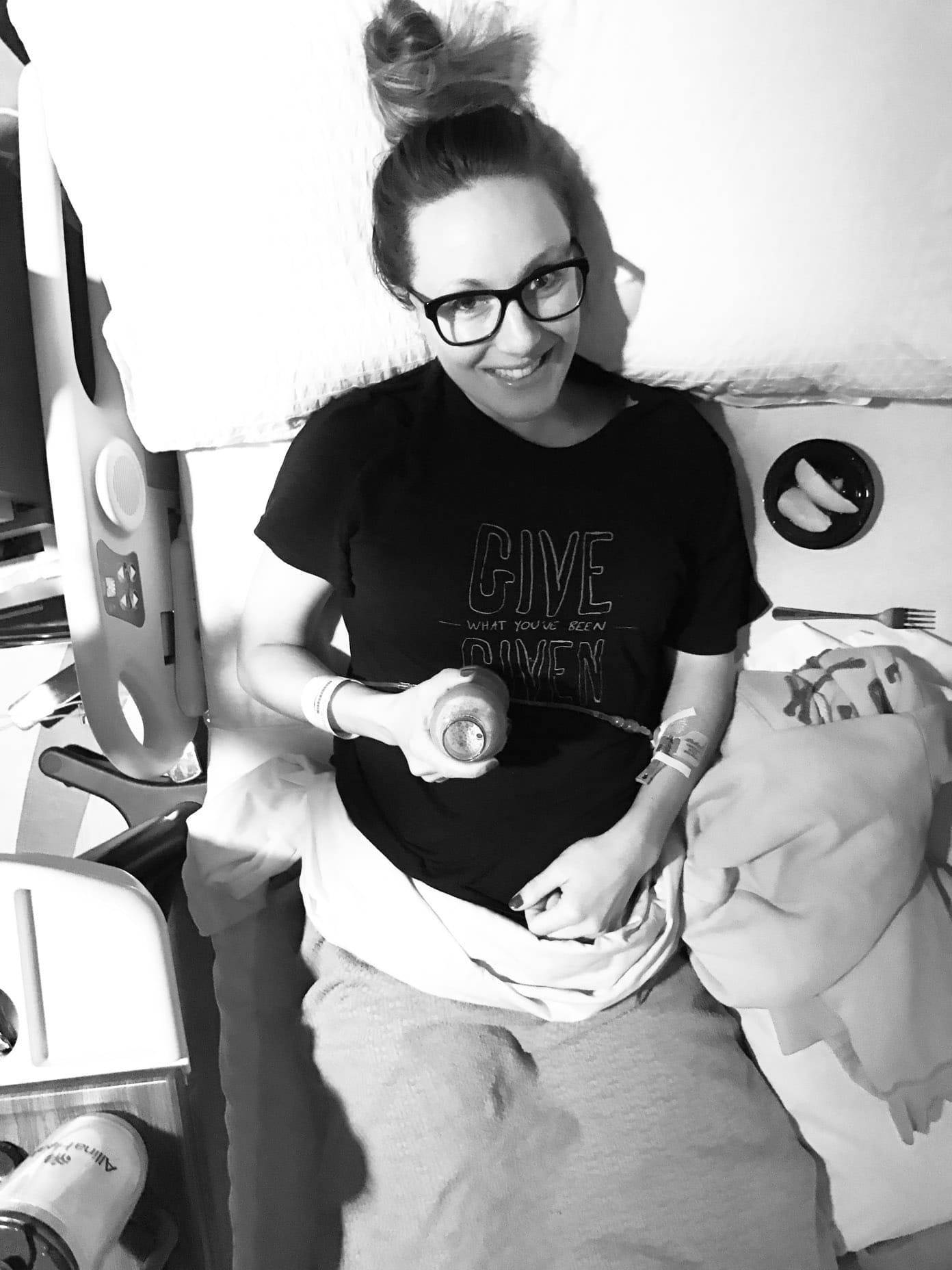
Friday night, two days after being admitted, my wall of confidence came crumbling down. I came back from a quick midnight trip to the bathroom and sobbed into my pillow. There was no blood, no visible physical change to signal that things were moving along. Even now, I wonder how much of that breakdown had to do with the weight of the emotions finally catching up with me after a full 48 hours on magnesium sulfate, and how much of it was just an intuitive, soul-level knowing.
That on some subconscious level, as a mom, I knew this would be my last night pregnant with Afton.
SATURDAY, DECEMBER 31ST
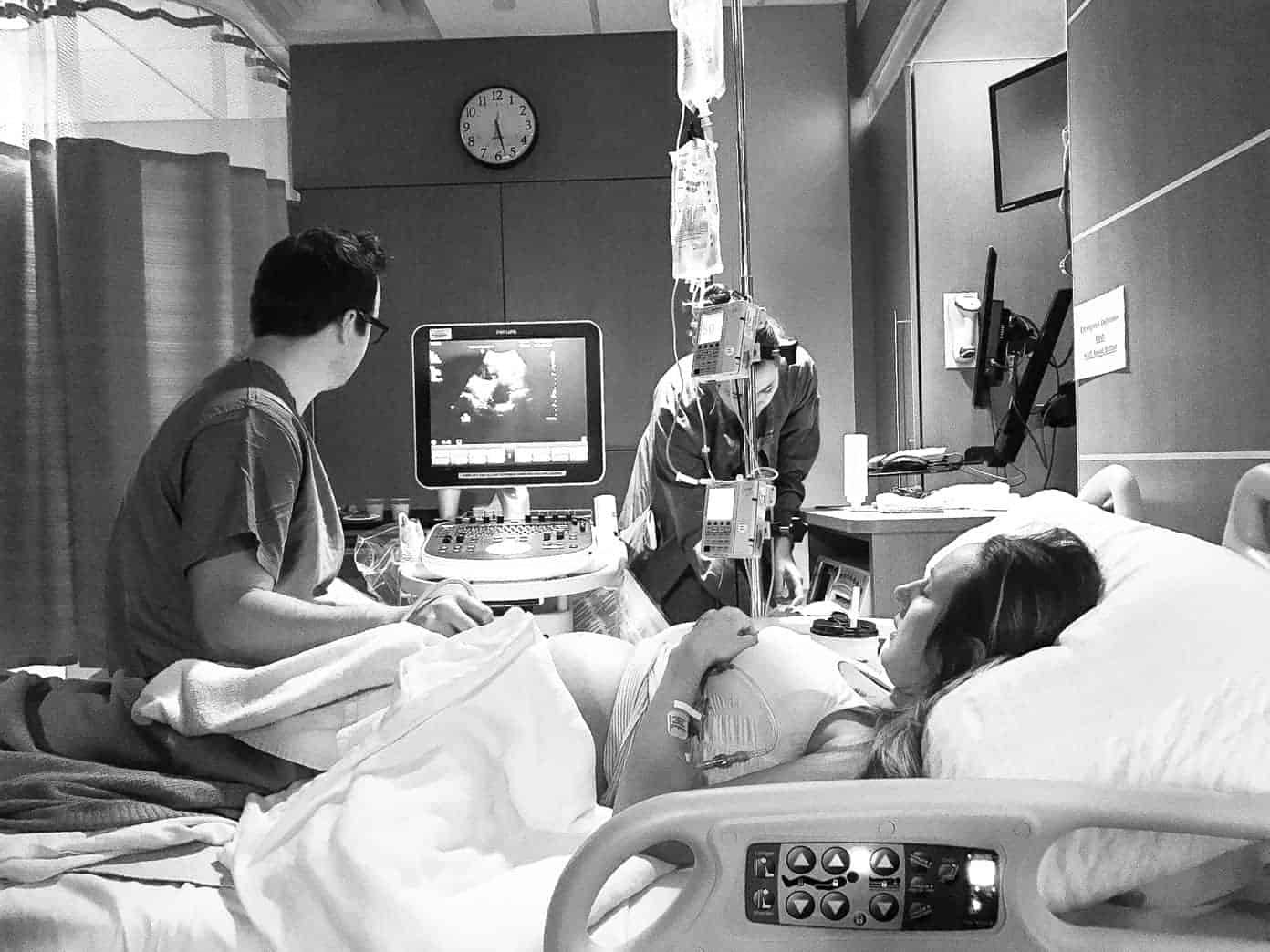
My lagging intuition proved right, and on Saturday morning things officially took a turn. I had been having intermittent contractions since Wednesday, and who knows how long before (a surprise to me, since I wasn’t feeling much of anything), but now there was no mistaking. I was feeling them with more intensity. And there was blood. I was uncomfortable and extremely anxious. And then I was anxious about being anxious. Was I causing this? Relax, relax, relax. My sister showed up to visit and I couldn’t even focus enough to talk to her.
I begged the nurse to send in a doctor. My pregnancy goal of staying calm had long since drowned in this ocean of medical chaos. A hospitalist came in to see us since our doctor was at another hospital, and she downplayed my worry about the blood. This was normal, she said. Exactly what part of this is normal? I wanted to say. It was not normal to be dilated to 4 centimeters at 23 weeks without knowing it, and it was not normal to see blood. HELP ME, I wanted to say. Keep my baby in there. Please.
Our nurse sensed that our situation needed more attention and she contacted our regular doctor. Bjork played some music for a while and we turned on the TV – a supposed distraction that proved to be ineffective since I have virtually no memory of it whatsoever – as we waited for the doctor to get there.
When the doctor arrived, we saw it on the ultrasound; the blood signaled a progression of labor. The water bag was continuing to move lower and lower, bringing a squirmy and lively Afton with it. On that last ultrasound, we saw Afton moving – his little hands and feet so adorable, kicking around wildly, full of life and joy, occasionally getting so low that his hands and feet were slipping right through my cervix. I was watching his birth and his death, live on the ultrasound. I willed him to stop. To just hold still. Please, baby. Please.
Afton was breech, and his body was too fragile to survive delivery, which meant for him to have a chance at life, we’d need to do a c-section. And because of his size, my doctor wanted to do a classical c-section. Classical c-sections carry a high risk of uterine rupture for future pregnancies and it was explained that I could, in no uncertain terms, never experience labor and delivery for a future pregnancy. There is no such thing as a VBAC with a classical c-section – I will never carry a baby full-term, or have my water break in a moment of surprise, or text Bjork to say “it’s time to go!” I’ll never give birth naturally. My doctor was firm about this as he handed me a pen. My hand was shaking violently as I signed on the line, consenting, but not. Another decision, another death.
They gave Bjork and I a minute alone. We cried. We held hands. We gave our sweet boy a name.
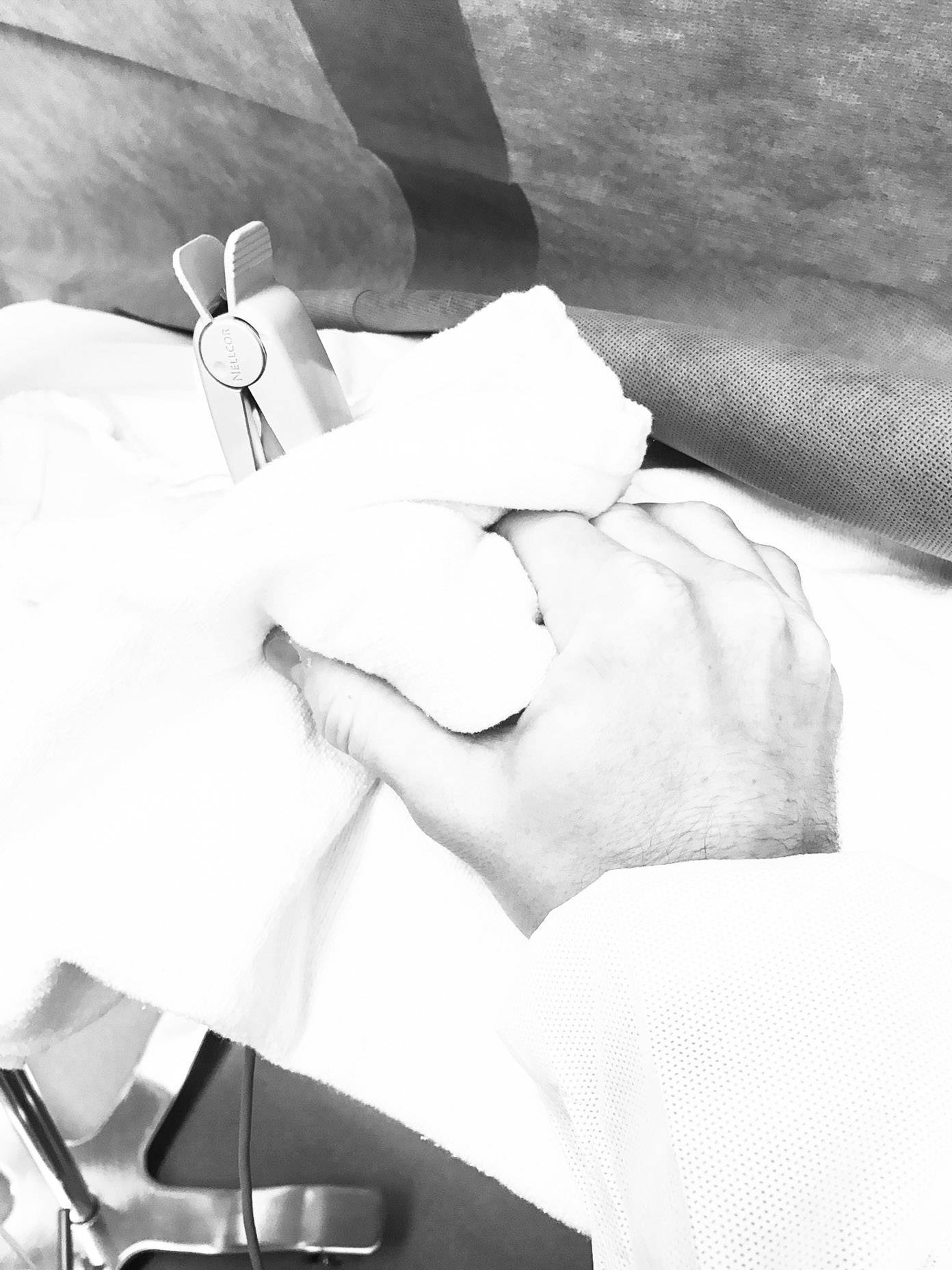
The nurses were swift as they prepped me, cutting my monitor band off and starting an aggressive IV of magnesium to protect Afton’s brain. I drank a vial of a some kind of borderline radioactive juice to prevent me from throwing up and choking during the c-section. I tried to move my hands and realized that I couldn’t. I looked down; they were red, clenched into fists. The veins were starting to bulge. I couldn’t move them. “Oh my gosh, oh my gosh. I can’t move my hands,” I told the nurse, feeling the panic rising.
“Oh, it’s okay, it’s probably anxiety,” she said, glancing down for not more than a second before turning back to the IV machine in a flurry.
I started to feel a lot of pressure. I mentioned it to someone and suddenly: Okay! Alright! Hurry, here, give your jewelry to your husband. Time to go!
They wheeled me into the operating room where everything was cold, blindingly bright, medical. I was with an entire fleet of medical professionals, but I was entirely alone. My whole body was shaking. They turned me on my side and I flinched with each touch, painful or not, as they tried to get the spinal in place. I remember saying, to no one in particular: “I’m sorry, I’m so sorry, I’m just so scared.”
There was a lot of commotion as I was moved back and forth from bed to table and a curtain was hung. Someone placed an oxygen mask over my mouth and then my doctor was there, looking me right in the eyes. “Lindsay,” he said. “What’s your happy place?” I tried to speak and couldn’t. It was as if someone had taken me completely offline. I could not remember how to make this work. But I also felt strangely relieved. Someone sees me. Someone knows I am afraid. Someone will take care of me and my baby. It took a mountain of focus to be able to eventually formulate just one word in response – and then another question, another one word answer. And then one word became two, and two became a sentence. I knew our doctor was asking me questions to keep me focused and calm.
Everything got quiet as things started. “Lindsay, if you knew what I was doing right now, you would not be happy,” my doctor said playfully as they did WHO KNOWS WHAT to make sure I was numbed up properly. Which, for the record, will forever stand as one of the weirdest doctor lines of all time. Was it funny or was it not? I didn’t know. My humor compass was disoriented. I gave a weak and feeble “…okay,” which might have been even weirder.
I heard someone reciting my full name and my date of birth, and then it started. It was silent except for my quiet cries as I saw Bjork come rushing in through the doors holding my necklace. I asked him to play Nickel Creek’s Sweet Afton on his cell phone. We played his song on repeat into the silent room for ten long, quiet, and strangely peaceful minutes until finally we heard the splash of my water breaking and I heard my doctor say, “Lindsay, he’s out! I’m holding him. He’s trying to cry!”
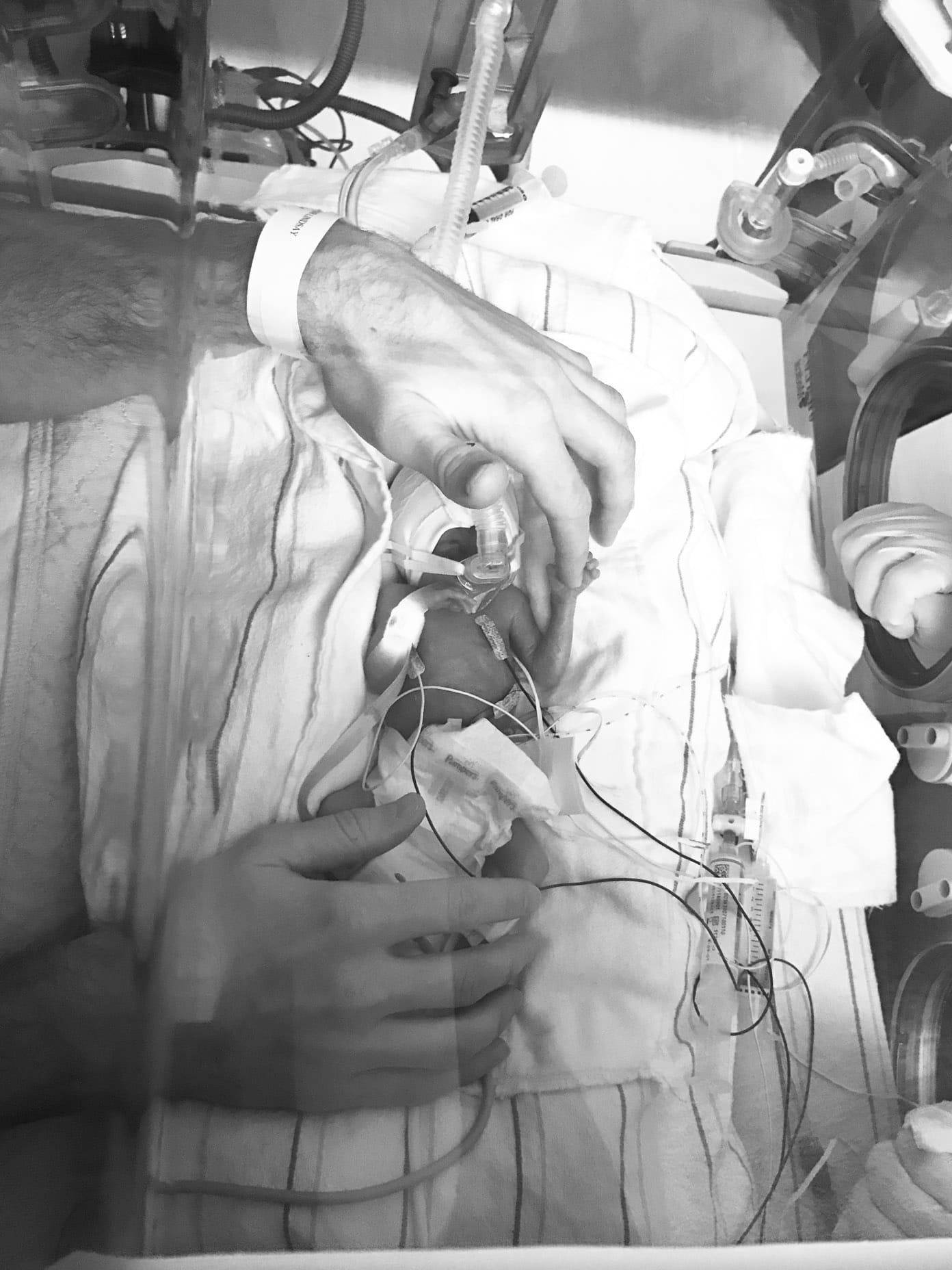
Several nurses started chiming in – “Lindsay, he’s so cute! he’s breathing! he’s crying – can you hear him? he sounds like a kitten! Dad, come back here and look!”
Our doctor told us later that as he pulled him out, Afton peed on him (hello world meet my AMAZING SON and why am I stupidly proud of this?!) as he moved his arms and legs around, acting more like a BABY-baby instead of a micro preemie in those holy seconds after he came into the world. I’m told that he eventually curled his arms up around himself and rested one hand sweetly up by his face. This makes me ridiculously happy. It also makes me cry. It was the transition from his world as it should have been – safe, warm, dark – to a new world where you have to struggle. Where you have to face oxygen, light, and air when you’re not even close to ready.
It was 2:25pm on a Saturday when Afton was born.
He weighed a perfect 1 pound and 3 ounces, and he measured in at 9.8 inches long, which makes me wonder if the post-birth measurement team didn’t have the time to get a suuuper accurate read on that one because 9.8 inches seems very, very short, even for a micro-preemie, but we’ll let it slide. He was born squirming and red, doing miraculous things like peeing and breathing on his own, even attempting a few meow-like cries. He got 8’s and 9’s on the apgar scale – the same one used for full-term babies. Mom-brag, no shame.
It is true that Afton made his entrance to the world in a cold and sterile operating room nearly four months too soon, and it was wrong. So wrong. They literally cut my baby out of me before he was ready. It is hard to get more wrong than that.
But it is also true that we did so good for him, all of us. That cold and sterile operating room was a place where his first sound was the easily-flowing acoustic melody to Sweet Afton, where his first touch was being cradled in the warm hands of gentle doctors, and where every moment of his transition from life inside to life outside was completely covered – just 100% saturated – in wild love from his mom and dad, terrified and dazed as they were. A room full of grandmas and grandpas and aunties and uncles waited down the hall and cried tears of joy when the doctor announced the safe arrival of a one-pound baby boy, and hundreds, maybe thousands, of real life and internet friends checked their texts and Facebooks and Instagrams, hoping to find news of our peanut’s grand entrance to the world.
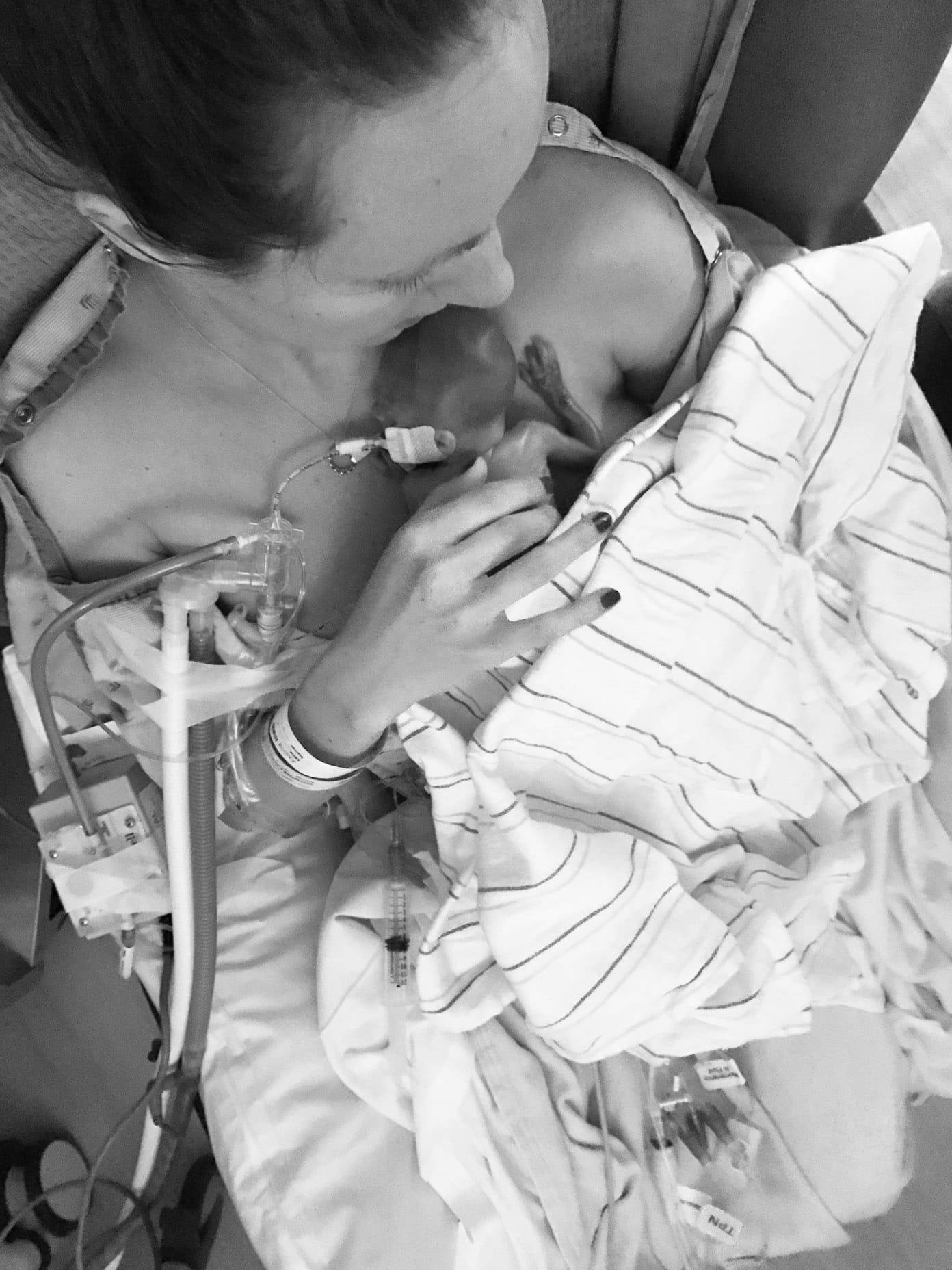
The trauma and terror cannot be unwoven from the threads that make up this story. They just can’t. But those threads exist only because he was loved and wanted beyond measure. And that? THAT is Afton’s real birth story.
I’m holding both of those truths, one in each hand: Trauma and joy. Death and life. Fear and love.
It was his one wild and precious life, and it was short, but we will claim it for him. We will pull the best and most beautiful threads out of his story that we can. Fear and love can live together, and love can still win.
This is Part One of Afton’s Birth Story. I am currently working on the second part of the story – the part where he’s in the NICU, where we get to meet him, hold him, and love on him before saying goodbye – and, to be honest, it could be a while till that’s done. This post took me more than a month to write. I think sometimes grief makes your heart bigger and your brain slower. Thank you for reading.
A few comments for the comments, if you feel like leaving one:
- Your comments mean so much to me. I read them. I print them out. We have a stack of them in Afton’s trunk with his clothes and his blankets and his books. That love and encouragement is very real to us.
- I am honored to have you share comments with your own personal experiences, whether they are similar or not. Thank you for trusting us with your stories, too. ♡
- My one request is that you is that you do not share medical advice. For example, “Did you get a flu shot? I’ve heard that that causes early labor.” Or, “You should get a second opinion about the VBAC. I know someone who had one after a classical c-section.” And so on and so forth. My broken heart just cannot handle it. We have had excellent medical care and we are doing the best we can to continue to make the best, most informed medical decisions for our family now and in the future and all that jazz. Thank you for understanding. Love you guys.
The post Afton’s Birth Story: Part One appeared first on Pinch of Yum.

